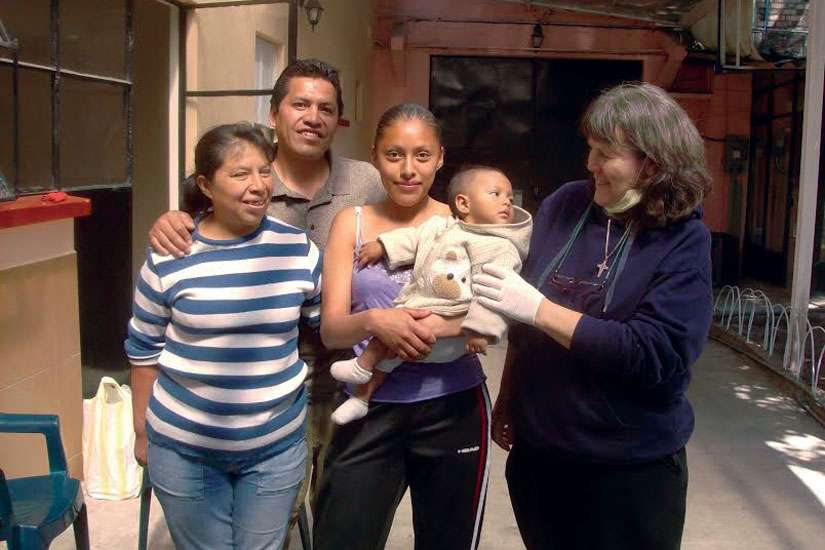Komar and her order, the Sisters of the Most Holy Trinity, have been sheltering and assisting vulnerable girls, conducting prison ministry and street ministry to youth and visiting natives in mountainous regions. Komar has been involved in this ministry since 1995.
Raised in Cambridge, Ont., Komar is a former tennis professional who competed in prestigious international tournaments before foregoing a tennis career for religious life, entering the novitiate in 1978 and making her final vows in 1987.
Komar is in southern Ontario to look after affairs related to her recently deceased mother, get treatment for knee problems and visit parishes to conduct mission appeals for her community’s ministry in Mexico.
One of her recent initiatives has been looking into the use of animals for therapeutic purposes among the people to whom the sisters minister. She has studied the success of such efforts among nuns in Minnesota who run a farm that helps at-risk children.
Mexico, a favourite source of sun and fun for many winter-weary Canadians, has increasingly made headlines in U.S. and Canadian media over the last two decades, mostly for the wrong reasons: the deadly drug wars that have claimed up to 120,000 lives according to some estimates, and more recently for U.S. presidential nominee Donald Trump’s vow to build a wall to keep illegal immigrants out of the United States.
Komar said that, like a coin, there are “two sides” to Mexico.
“I love the Mexican culture and people. I think there is more good, ironically, than bad,” she said. “Yes, there is the reality of the drug war, but apparently it’s nothing new. It has existed for a long time.”
She described herself as a person who looks for the positive and noted Mexico is not alone in terms of enduring corruption and societal problems.
“It’s everywhere. I can’t point my finger just at Mexico and the drug war and say things are really, really bad … I also believe in the grace of God. I believe that God is greater and bigger than evil. Because of technology, we know more about stuff. It’s instantaneous. Is it worse than before? I don’t think so.”
Komar illustrated the point by adding that it is not unusual for her to feel more uncomfortable walking down a street in a Canadian city than in Mexico City.
“We have to be aware of the evil, but we also have to be aware of the good,” said Komar. “Most people in the world, I believe, are good. Even in Mexico, people have time to stop and talk. People are grateful. It’s a very rich country in resources. I believe Mexico, in 50 years, will be equal to Canada and the United States.”
Following up on the initial efforts of the “Three Amigos” — at the onset of the new millennium, former prime minister Jean Chretien, U.S. president George W. Bush and Mexican leader Vicente Fox made moves toward greater North American collaboration — she said she would like to see a greater spirit of co-operation among the three nations.
“I wouldn’t go back to Mexico if I did not have hope,” said Komar. “Our sisters are still there and people are still doing good. Yes, the situation is tense with security sometimes … (but) I really hope and wish we would try to help Mexico more instead of just taking advantage — getting things done cheaper.”
Canadians could make a positive impact by helping Mexico improve its economy, she said, because “if people have jobs, they don’t look for other ‘jobs’ that are not dignified, like jobs that involve hurting people … I really feel it’s a social obligation we have in North America.”
She admires the Mexican people for being intelligent and appreciating the opportunity to work.
“They’re not totally a throwaway culture. They are still with nature and using things to the maximum.”
As for herself, she pledged to return to Mexico soon, continue her animal-therapy project and be involved in any other way she can.
“I would do the same thing over. I would do the tennis life and I would enter (the religious life). I don’t regret anything … We’re helping the girls, they’re going to be better. They’re going to get jobs and so won’t have to do things that aren’t healthy for them or others.”
She concluded, “It’s definitely a challenge as Christians and Catholics to really live what Jesus tells us. Thank God Pope Francis is a great advocate of helping our neighbour and forgiving our neighbour … We have to reach out constantly more, really be the way Jesus wanted us to be.”
(Gosgnach is a freelance writer in Hamilton, Ont.)


